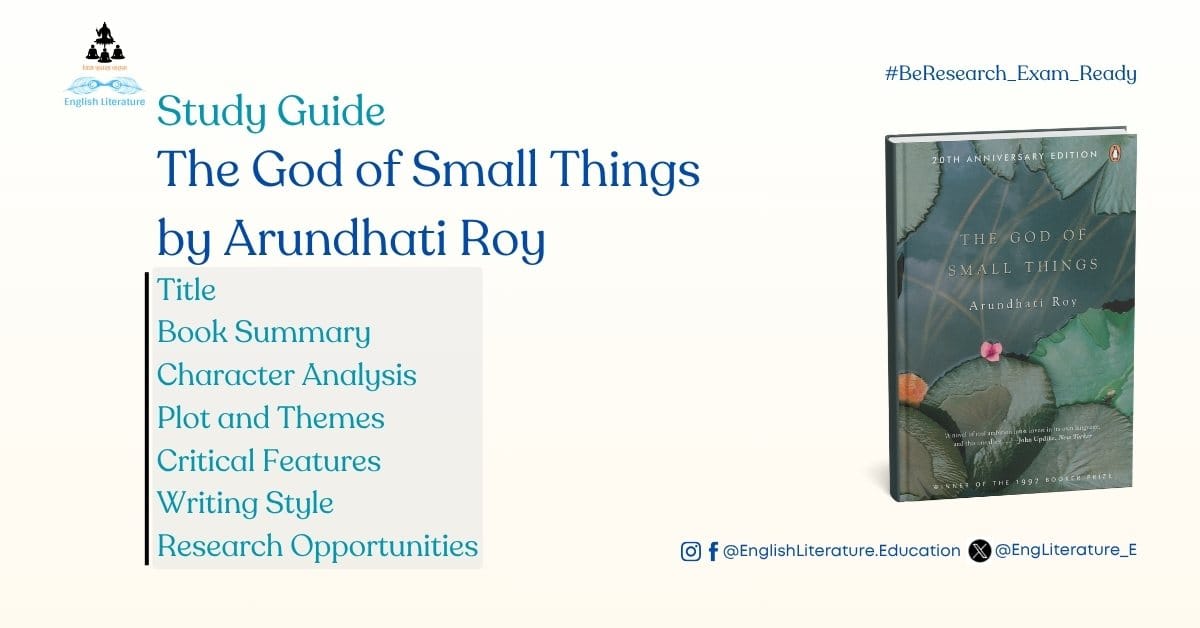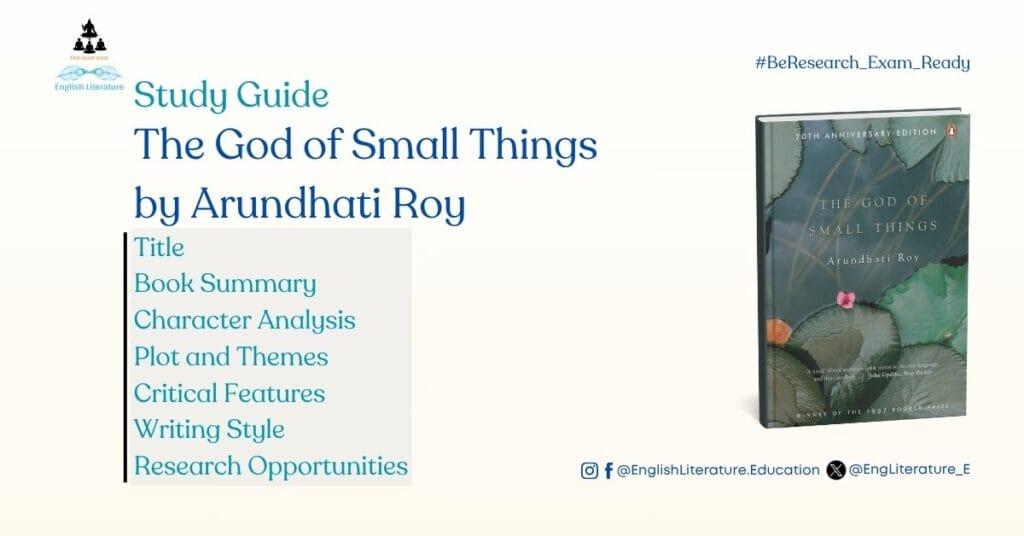The title The God of Small Things resonates with layers of paradox, subversion, and poignancy that frame the entire narrative. It compels readers to reflect on how seemingly insignificant occurrences, those “small things,” carry immense emotional weight and moral significance, shaping characters’ lives, informing socio-political relations, and ultimately determining the novel’s tragic arc. The phrase itself acts as a keystone: it honours not a deity of grandeur or cosmic authority, but the power embedded in the delicate fibres of domestic life and interpersonal connections.
In a literal sense, God may or may not be an omnipotent entity, but certainly every child’s perception of authority, wonder, and inexplicable forces governing existence. For Rahel and Estha, the twins whose consciousnesses anchor the story, small actions such as dropping a mango, whispering a secret, or pretending a clay snake is alive feel monumental. Their world is one where the smallest decision or utterance can unleash catastrophic consequences. Thus, the real “God” is their own emotional world, where gestures accumulate meaning and become binding. These acts of meaning-making are themselves divine in that they confer significance upon the mundane: a look, a broken ornament, a forbidden romance, a broken love law.
More profoundly, these small things reveal the ideological power systems that govern postcolonial India. A lotion dabbed on cracks in Pappachi’s vanity, Mammachi’s decaying pickle factory, or Baby Kochamma’s obsessive television viewing, each seemingly trivial ritual speaks volumes about lingering caste hierarchies, gender entrapment, and the banalities of neo-colonial consumer culture. A government Minister’s visit to Pappachi’s home signifies not just public politics but the power dynamics in domestic spaces. The novel suggests that grotesque political corruption and human cruelty are not solely the domain of grand institutions but are equally enacted at the level of personal interaction. Thus, the “God” presides over the small acts of tacit consent, betrayal, and everyday injustice that reproduce systemic oppression.
This is starkly embodied in the relationship between Ammu and Velutha. Their doomed love is whispered into existence—quiet, subtle, intimate—yet it defies the visible architecture of caste, morality, and state violence. Their transgression is small in scale but insurgent in intent, unleashing a tidal wave of brutality. The novel articulates that it is not grand revolutions but intimate sins that expose hierarchies with brutal clarity. The narrative calls attention to how political betrayals often originate not on a stage of ideologies but within the hush of private rooms and whispered yearnings. It is no accident that the twins learn that the most minor transgression, two minutes of shared skin with Velutha, can provoke the most savage outcome: the state-sanctioned erasure of a person.
Simultaneously, Roy draws our eye to the small forms of resistance that persist under such pressures. Estha running away into childhood trauma; Rahel’s carved doll acting out what words cannot; even Velutha’s secret carpentry—each reclaims personhood within constraints. These minor acts are the true worship of the “God of Small Things”: the insistence that an individual’s trace remains in a world desperate to abolish difference, to render them invisible.
It is crucial to appreciate how the novel’s lush, meticulously constructed language mirrors this theme. Roy’s repeated imagery of moths, river stones, and decaying florid details is not decorative but deliberate. Each fragment, like the peeling bark of an areca nut tree or the ticking of a broken watch, functions as a microscopic archaeology of loss and longing. She invites readers to slow down, to see how the cumulative weight of these details reveals larger structures of power and emotion. The attention to minutiae becomes devotional, compounding the title’s significance: to truly know the god, one must attend to what seems trivial.
On a meta-narrative level, the novel complicates the idea of authorial intention and narrative authority. By foregrounding the importance of small things, Roy rejects the hierarchy that privileges grandiose sagas and national epics. Instead, she gives “voice to the voiceless and small,” reclaiming cultural memory from official historiography. She dismantles the imperial archive by excavating marginalised lives, not so much with revolutionary slogans as with the calibrated precision of personal detail. The god, here, is the art that emerges from oral histories, family secrets, local idioms, and regional rituals. It is a performative reclamation of history by those who are most often erased.
To say that the “God of Small Things” governs the novel’s universe is to say that the everyday is the seat of transcendence. Roy’s genius lies in showing that every household transaction, like buying pickles, watching a soap opera, and celebrating Brassington’s visit, is a node in a matrix of power relations. She makes the political porous, seeping into the domestic with ferocity. It is in the falling of a boy from a train, the disintegration of a family home, the lingering aftertaste of Forbidden Love, that the greatest reckonings occur. Each small event is a pebble dropped in the pond, sending ripples outward that eventually shatter lives.
Contextually, this concerns the postcolonial conundrum of scale and representation. India’s freedom is negotiated not only on the battlefield or in diplomatic conferences but also behind curtained windows in sleepy Kerala towns. Roy suggests that if the small is not reckoned with, the big—as ideology, nationalism, capitalism, patriarchy—will continue unchallenged. She reminds us that postcolonial society is not only the product of colonial rule but also of daily reinforcements of caste, gender, and economic inequality. The small is thus Eden: the reservoir of human dignity, as well as the locus of betrayal.
Finally, the title gestures at literary ethics. Roy stands opposed to consolatory storytelling. She refuses the pieties that flatten grief. By asserting that small things matter, she validates grief, uncertainty, and moral ambivalence. She places responsibility on readers to acknowledge the consequences of what is often dismissed as incidental. This insistence enshrines the “God of Small Things” as a moral imperative: the silent watchdog that insists that lived reality, not just narrativised justice, matters.
In summation, The God of Small Things is a theological statement, a political manifesto, and a literary liturgy all at once. The “God” is the network of intimate forces that shape lives; the “small things” are all the gestures, memories, and quotidian tragedies that accumulate into histories of oppression and brief moments of redemption. Roy’s fiction reminds us that to witness the small is to approach the divine, small enough to let the world slip through its fingers, yet profound enough to shape destinies. The novel’s insistence that these small things matter is a challenge: it demands that readers realign their moral compass, locate empathy in minutiae, and confront the systems that thrive on human invisibility.
Do you want to explore more about this novel? Get back to The God of Small Things Study Guide.
Alok Mishra for English Literature Education’s Indian English Literature Project



1 Comment. Leave new
Well explained!